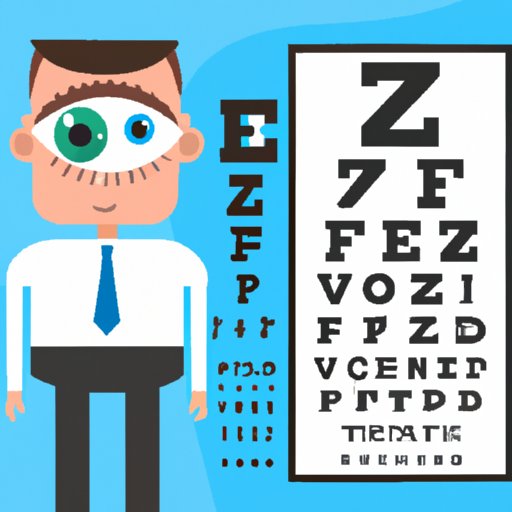
Introduction
Eye exams are an essential part of maintaining overall health. Whether you have perfect vision or wear corrective lenses, regular eye exams can provide important information about eye health and potential vision problems. In this article, we will discuss how often people should get their eyes checked, how eye health affects vision, the importance of routine eye exams, and much more.
Benefits of Regular Eye Exams: How Often Should You Go?
Regular eye exams can help detect vision problems early, before they become more severe. It is recommended that people get their eyes checked every 1-2 years, but the frequency may vary depending on various factors such as age, medical history and family history of eye diseases.
For children, it is essential that they receive regular eye exams starting at ages 6 months, then again at 3 years old, and before they start first grade. Children who already have a history of refractive errors (nearsightedness, farsightedness or astigmatism) may need more frequent checks.
For adults, the recommended frequency of eye exams may vary depending on age and other individual factors. In general, adults should get their eyes checked every 1-2 years until age 65. After age 65, eye exams should be done annually, as age-related eye problems are more common as we age.
However, certain factors, including a history of eye disease, injury, or diabetes, may indicate that an individual needs more frequent eye exams to monitor changes in eye health and catch any potential problems early.
Eye Health and Maintenance: How Often Should You Book Eye Exams?
Eye health is critical for maintaining overall vision. For people with healthy eyes and no history of eye problems, regular eye exams can help maintain optimal eye health and catch any minor problems before they become more severe.
For people with existing eye problems, routine eye exams are even more critical. People with chronic eye conditions such as glaucoma and macular degeneration need more frequent eye exams to monitor changes in eye health and catch any potential problems early.
For those with healthy eyes, it is recommended that they visit an eye doctor at least once every two years. However, individuals with factors such as a history of eye problems, eye injury, or diabetes, should talk to their eye doctor about their individual needs for more frequent eye exams.
The Importance of Routine Eye Exams: When to Schedule an Appointment?
Routine eye exams are essential for maintaining good eye health throughout life. Detecting any potential problems early can help prevent serious vision loss or complications.
The best time to schedule an eye exam is when you notice any significant changes in vision. It would also be best if you saw an eye doctor as soon as possible if you experience sudden changes in vision, eye pain, or other symptoms such as floaters, flashes of light, or double vision which may signify a more serious eye problem that needs immediate attention.
People should also make an effort to schedule regular routine eye exams even if they feel like their vision hasn’t changed. Doing so can help catch underlying eye problems early and prevent severe eye damage.
How Often Should You Visit an Eye Doctor for an Eye Exam?
The frequency at which an individual should visit an eye doctor for an eye exam depends on various factors, including age, medical history, and family history of eye problems.
For children, regular eye exams are essential to make sure any vision problems are detected early and treated promptly. The American Optometric Association recommends that children receive eye exams at ages 6 months, 3 years, then every two years after that, unless directed otherwise by an eye doctor.
For adults, eye exams should be scheduled at least once every two years. However, people who are over 65 years old or have chronic eye conditions such as glaucoma and macular degeneration should be seen annually.
Individuals with specific health conditions such as diabetes, autoimmune conditions, or a family history of eye disease should speak to their eye doctor regarding their recommended eye exam frequency. People who have already had corrective surgery and are over 40 may also need more frequent exams.
It is essential to also note that follow-up appointments may be necessary in some cases, depending on the outcome of your last exam. People who have been diagnosed with eye problems and are receiving treatment may need more frequent exams to monitor any changes which might affect treatment outcomes.
Keeping an Eye on Your Vision: A Guide to Eye Exams and How Often to Get Them
The importance of eye exams cannot be overemphasized enough. Regular eye exams are essential for maintaining overall eye health and catching minor problems before they become severe.
For most people, eye exams should be scheduled at least once every two years. However, individuals with a history of eye problems, chronic eye conditions, or diabetes, may need to be seen more frequently. Children also require regular eye exams starting at age 6 months, at age 3 years, and before starting first grade to ensure optimal eye health and development in the early stages.
References
- American Optometric Association. (2015). Comprehensive adult eye and vision examination. AOA. Retrieved from https://www.aoa.org/documents/optometrists/CPG-2.pdf
- American Optometric Association. (n.d.). Eye exam guidelines for children. AOA. Retrieved from https://www.aoa.org/patients-and-public/good-vision-throughout-life/childrens-vision/pediatric-eye-examination-and-visual-assessment
- Centers for Disease Control and Prevention. (2019). Vision Health Initiative. CDC. Retrieved from https://www.cdc.gov/visionhealth/basics/ced/index.




